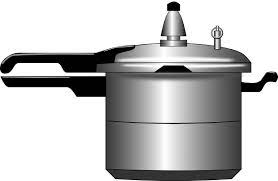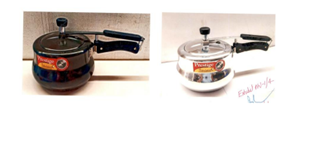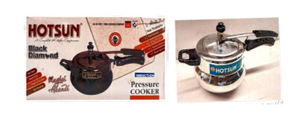 Design piracy and recovery of damages after the expiration of suit design, a contentious issue, has come to the forefront in a recent case between TTK PRESTIGE LTD. vs GUPTA LIGHT HOUSE involving pressure cookers. TTK Prestige, the plaintiff, accused the defendant of infringing their registered suit designs by manufacturing and selling pressure cookers that closely resemble their own.
Design piracy and recovery of damages after the expiration of suit design, a contentious issue, has come to the forefront in a recent case between TTK PRESTIGE LTD. vs GUPTA LIGHT HOUSE involving pressure cookers. TTK Prestige, the plaintiff, accused the defendant of infringing their registered suit designs by manufacturing and selling pressure cookers that closely resemble their own.
The plaintiff argued that the defendant’s pressure cookers are either fraudulent or obviously imitative of their registered suit designs. The plaintiff presented a comparison of photographs, showcasing both their own pressure Handi cookers and the defendant’s rival products as under.
The plaintiff’s product | The defendant’s product |
 |
|
The primary defense raised by the defendant was that the suit design is invalid due to prior publication. In response, the plaintiff refuted by stating that there is no evidence of prior publication of the suit design. They pointed out that any representations of pressure cookers with similar designs filed by the defendant occurred after the plaintiff’s suit design was registered in 2004.
The defendant emphasized that the suit design has expired since its registration period ended in September 2019, making it accessible to the public for exploitation. As a result, the defendant argued that no permanent injunction against the use of the suit design could be granted, and there should be no order to deliver up any infringing goods.
Moreover, the defendant challenged the novelty and originality of the suit design, claiming that it was merely a replication of a pre-existing design—the handi pressure cooker, a well-known cooking vessel used in India since ancient times. However, the court dismissed this argument, affirming the novelty and originality of the plaintiff’s suit design.
The Delhi High Court concluded that the plaintiff’s cooker design holds a valid registration, as it possesses distinctive eye appeal with its unconventional bulging mid/lower section, setting it apart from ordinary cookers and meeting the criteria for design registration. Furthermore, after conducting a thorough comparison between the suit design and the defendant’s product, the court ruled in favor of the plaintiff, declaring the defendant’s design to be imitative of the plaintiff’s registered design. The court rejected the defendant’s claim of prior publication due to the lack of substantial evidence supporting it.
Regarding the functionality argument, the court clarified that functional designs can still be eligible for registration if they possess aesthetic appeal. Since the suit design demonstrated such appeal, the court dismissed the plea that it was purely functional.
Although the court ruled out the possibility of a permanent injunction or delivery up of infringing goods, the plaintiff was granted the right to seek damages. The court directed the defendant to provide accounts of their earnings from sales of pressure cookers bearing the impugned designs. The plaintiff was also awarded costs for the litigation.
The court’s judgment reaffirms the validity and uniqueness of the plaintiff’s registered design while confirming the defendant’s design as an imitation of the suit design. It serves as a significant precedent in design piracy cases, underlining the importance of recovering damages even if the suit design has expired.




